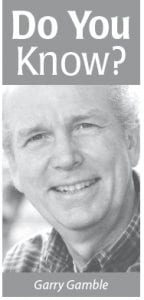Have you ever observed the proceedings of a commissioner meeting and asked yourself that question?
We’ll attempt to answer that question, but before we get started, this heads up…I am going to ask–albeit posthumously– Thomas Paine to collaborate on this week’s column. For those who are unfamiliar with Mr. Paine, he was an 18th-century English American writer and pamphleteer whose “Common Sense” publication marshaled moral and political arguments to encourage common people in the Colonies to fight for accountable government.
So…to whom are elected officials accountable? Should it be the people who cast their vote, thereby entrusting responsibility to represent their values when making decisions; or are elected officials only accountable to themselves and what they deem to be right based on their perspectives, personal preferences or emotions at the time; or do elected officials coddle to the most influential, the loudest voice, those they perceive can do for them the most good…or vice versa?
We should probably clarify what we mean by accountability before digging deeper. Simply stated, accountability is a willingness to accept responsibility or to account for one’s actions. Stephen R. Covey asserts, “Accountability breeds response-ability.” (You won’t know him, Mr. Paine, he’s the author of a popular book, “The 7 Habits of Highly Effective People,” published 213 years after your still reigning all-time best selling American title, “Common Sense.”)
Accountability itself is a tricky thing. People react to being held accountable in different ways in different situations. One would think that having to answer to someone for your actions or your decisions would make you think more carefully about whether you’re doing the right thing. According to research done by Philip Tetlock, a professor of psychology and political science at the University of Pennsylvania, “It sometimes does make people engage in more ‘exploratory thought’ before making a decision. But sometimes it doesn’t. Sometimes it just inspires people to defend more stridently what they already believe. Sometimes it motivates people to conform with the views of the audience to which they are accountable; what we call ‘elastic-band shifts,’ when people move to where the audience is, but when the audience disappears they snap back. They’re very good at impression management. They’re very good at spinning things….”
In my mind—not that anyone really wants to venture there—personal accountability requires a great degree of self-honesty, which, in our day, could be classified as an endangered species. Lamentably, we are too often consumed with maintaining appearances. Any comment, Mr. Paine, from your perspective? “Yes, I believe ‘He who dares not offend cannot be honest.’”
The reality is fixing a problem is going to require making hard decisions – which inevitably will alienate some of an elected official’s voter base; and most officials want to get re-elected. Again, Mr. Paine, “Government is not a trade which any [one person] or body of [persons] has a right to set up and exercise for [their] own emolument [advantage, profit, or gain], but is altogether a trust, in right of those by whom that trust is delegated, and by whom it is always resumable. It has of itself no rights; they are altogether duties.”
I agree, I’ve always maintained, elected officials should see themselves, not as “empowered” rather “entrusted.” Empowerment comes to the extent we are trust-worthy… accountable to the voters who presented to us the opportunity to represent them.
Thomas: “I have found [those] who look upon themselves born to reign, and others to obey, soon grow insolent; selected from the rest of mankind their minds are early poisoned by [self] importance; and the world they act in differs so materially from the world at large [living in different truth universes], that they have but little opportunity of knowing its true interests.”
One of the most important characteristics of a public servant is the willingness to listen; the ability to welcome and appreciate different points of view rather than just trying to prove one’s point. A public servant is expected to check facts; suspend judgment and hear everyone out before making decisions. Elected officials must guard against being blinded by ideology and prejudice or warped by personal interest, unable – or unwilling – to hear the concerns of others.
You’ve been quoted, Mr. Paine, as saying, “Where knowledge is a duty, ignorance is a crime.” “Yes.” Can we assume that those who are elected to represent the best interests of the electors—the citizens—should hold themselves accountable for making informed decisions, thoroughly researching issues and decisions that come before the board before acting on those decisions?
I’ll give you the last word, Tom…before we close the lid:
“A body of [individuals] holding
themselves accountable to
nobody ought not to be trusted
by anybody.”
Thomas Paine
Former Cook County Commissioner Garry Gamble is writing this ongoing column about the various ways government works.



Loading Comments